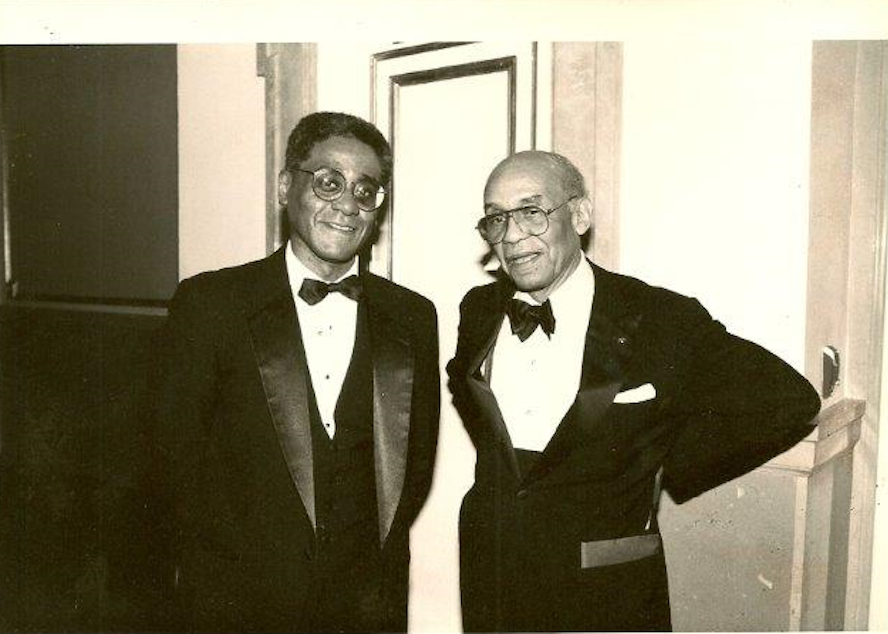Charles Johnson On Buddhism And The Black American 'Minefield'

As a teenager, University of Washington professor emeritus Charles Johnson discovered a book on yoga and meditation on his mom’s bookshelf that sparked his interest in practicing Buddhism.
Johnson spoke with Marcie Sillman on KUOW’s The Record to discuss the intersection of race, religion and his writing. His newest book is called “Taming the Ox: Buddhist Stories and Reflections on Politics, Race, Culture, and Spiritual Practice.”
Interview Highlights
On Buddhism
My creative work and my spiritual life and spiritual practice are very much intertwined.
Sponsored
Buddhism is non-dualistic. This is what distinguishes it from every other world religion: it is non-dualistic and noncompetitive. And according to Paul Tillich – the great Christian theologian – that makes it one of the most competitive religions in the world, the very fact that it isn't competitive!
But one of the things Buddhism recognizes is that wisdom can be found anywhere. It is not the property of the East or the West. So you can find wisdom just under your feet.
Whatever it is you're interacting with, whatever it is you're engaged with, whoever it is you're talking to, it's you. Because Buddhism does not divide the world up into "self" and "other" that way. So that's the motto: "Whatever it is, it's you."
On Ferguson, Eric Garner Cases
I have been stopped, my son has been stopped by the police on occasion in New York and here in Seattle — always a case of mistaken identity. But as a black American male you live with that.
Sponsored
We have to walk across a minefield where people have planted mines and IEDs for us to step on and blow ourselves up. And if you don't learn that in childhood, you get blown up. You have to know where the minefields are and that means you have to listen to your black elders who had crossed that minefield to a certain extent, and they can tell you where the dangers are.
Now with those cases (Michael Brown and Eric Garner), you naturally feel anger.
You can take that energy of anger and transform it into constructive action, so you don't have to lose control of your mind and emotions. But you can look at anger and you can transform it into something that is going to reduce suffering.
On Race And Education
Now one of the things that we've been told – and I think it's happening already – is that by 2042, or something like that, we have the browning of America whereby minorities will outnumber white Americans for the first time.
Sponsored
And that is causing a big demographic shift, a sea change. It's already affecting the school curriculums in California K-12 because the education that we gave kids really up until quite recently was very Eurocentric. It was very much for white kids.
And then you had the period of integration beginning with Brown vs. Board of Education. A lot of black students came into schools where the curriculum was all white.
I never was introduced, K-12, to a black author. The first book I found by a black author was, again, in my mother's library. It was Richard Wright's “Black Boy.”
In 1966 I went to college and it was around 1968 that black studies began. I participated in my school's formation of a black studies program, and so we got more people of color into the curriculum in the liberal arts and humanities. But that's an ongoing challenge. We still have to figure out how to juggle so much of this in our schools and that applies to media as well.
On Materialism
Sponsored
I think we're living in very dangerous times. I've never been a very materialistic person, I just am not like that, and I’ve not been particularly much of a hedonistic person either. What works for me is work and discipline and personal discipline. And I think we're at a point in the early 21st century where people are questioning materialism.
We're bombarded every day by 3,000 product messages. It's there in your subconscious even if you're not consciously aware of it.
I think we have to make decisions about what we feel is the "good life" and what our goal should be in life and not have those dictated by a very materialistic and sometimes decadent society.
I think a lot of young people get disenchanted with the idea that all they're supposed to do is work to have and get material things, and there's no turning inward to look at one's own mind and how it operates.

